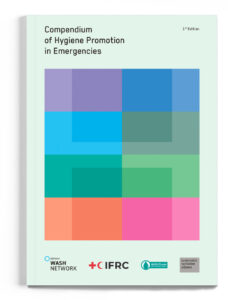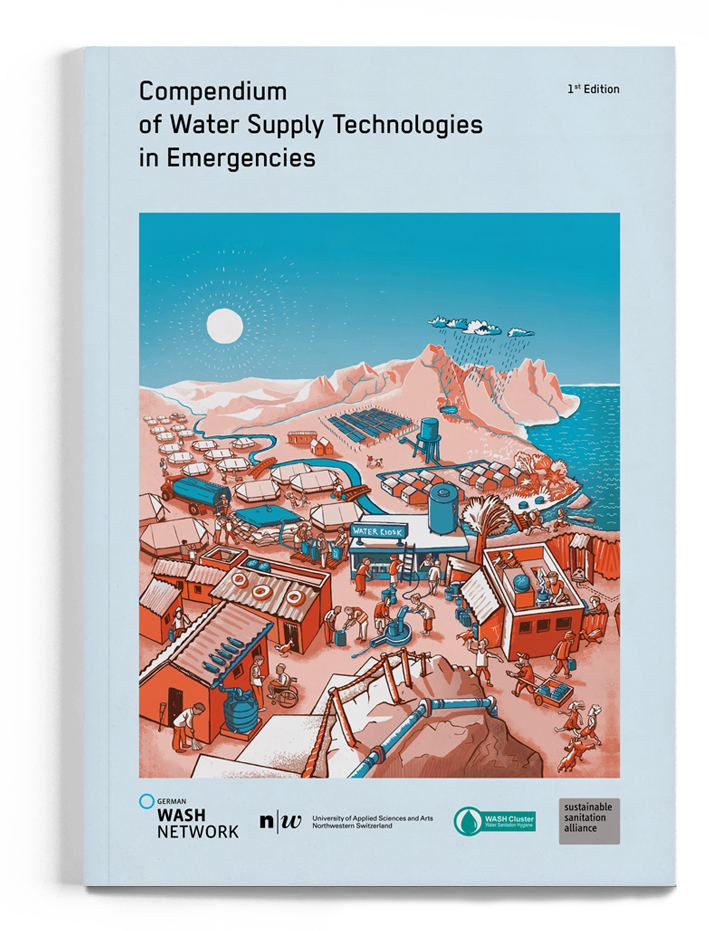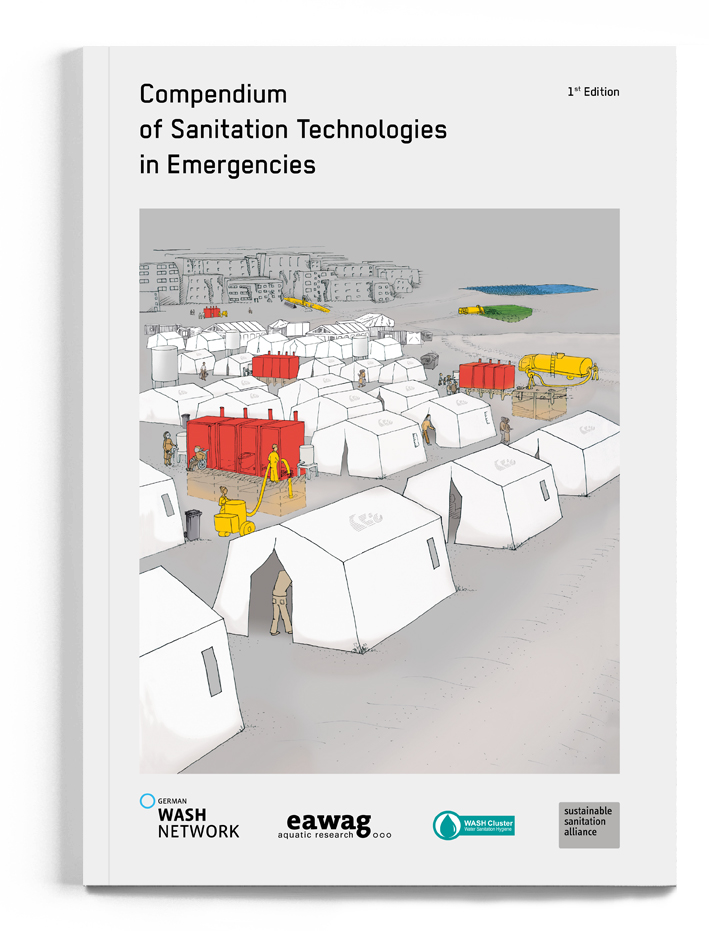Stockholm World Water Week 2017

Showcase: Improving Emergency Wastewater Management – The Compendium of Sanitation Technologies in Emergencies
Appropriate and adequate sanitation hardware solutions and respective management of faecal sludge (FSM) are imperative for the protection of human and environmental health in emergencies. With a variety of humanitarian contexts that are becoming increasingly longer-term or protracted, there is a need to put a much stronger sector focus on a systems approach in emergencies by looking at the entire sanitation service chain (from toilet, via collection, transport, treatment until safe disposal/reuse) ranging from proven technologies to innovative and emerging technology options. The “Compendium of Sanitation Technologies in Emergencies” currently being developed by German WASH Network, Eawag, Global WASH Cluster, SuSanA and key humanitarian WASH organisations is trying to fill this gap with a user-friendly, state-of-the-art capacity development and decision support tool based on the experience and expertise of a wide range of humanitarian and development WASH professionals. The publication is intended to be launched by April 2018 as part of the Global WASH Cluster Annual Meeting. Stockholm World Water Week provided an exceptional and timely platform to present a first draft of this multi-agency publication as it allows bringing together humanitarian and development actors from policy to practise to get in-depth feedback on the structure, dissemination strategies and synergies with other on-going initiatives.
Showcase: Improving Emergency Wastewater Management – The Compendium of Sanitation Technologies in Emergencies
30 August 2017 I Room NL253
09:00 Existing sanitation challenges: Reflections from recent emergencies, Franck Bouvet, GWC
09:10 The Compendium of Sanitation Technologies in Emergencies, Robert Gensch, German WASH Network
09:30 Round table discussion
- Structure: How to best reflect the complex and multifaceted nature of disasters (different phases, contexts etc.) in a simple, systematic and comprehensible document structure
- Dissemination: How to create a constant learning platform and living document via a Compendium online platform, corresponding trainings etc.
- Synergies: Potential synergies and compatibility with other ongoing activities like Sphere, HIF, SSWM etc.
10:15 Summary from the tables
10:30 Close of the session
Results and Recommendations
Table 1: Structure
Additional cross-cutting issues:
- Basic hydrogeology (e.g. percolation test to understand how fast a latrine will fill)
- Development over time (e.g. opportunities to upgrade system based on existing infrastructure and services)
- Cholera prevention and management
- O&M (including training of people, how to put together a team)
- Cleaning of toilets and equipment (incl. tools and materials that have to be provided for that) – this could also be included under a cross-cutting page on O&M
- Private vs. public toilets (transition from shared to family, how long it usually takes in different situation, how long people typically accept different kinds of shared solutions in different contexts)
Additional technologies to be included
- On-site aerobic wastewater treatment systems (like Japanese Jokasou, or other prefab units), was also mentioned by somebody as a potential option for sludge treatment
- Container-based treatment also under off-site technologies (e.g. lime treatment)
- Soak pit for “Cholera Liquid”
- Incineration for MHM products
- Combustion (should be there already, but didn’t appear on the poster)
- Composting toilet
Other recommendations
- Medical waste as input product which requires special attention. Incl. medical liquid waste. Solid waste in general was also discussed, but no clear
- Separate technology overviews for
- Areas where you can’t dig (rocky ground, flooded areas, high GW table, unstable soils)
- Urban Areas
- Acute/Rapid Response
- Transition and Recovery
Table 2: Dissemination Options
Hardcopy/Softcopy Dissemination:
- Potential global events/conferences
- Global WASH Cluster Annual Meeting (April 2018, Berlin)
- Humanitarian Congress Berlin (October 2017 and 2018, Berlin)
- AidEx (Nov. 2017 and 2018, Brussels)
- Humanitarian Congress Vienna (March 2018, Vienna)
- World Water Forum (18-23 March 2018, Brasilia, Brazil)
- FSM 5 (Jan 2019)
- WEDC Conference (July 2018)
- Regional or national events/conferences
- Arab Forum for Environment and Development, AFED (2-3. Nov. 2017, Beirut)
- Arab Water Forum (Nov. 2017, Egypt) & Arab Water Week (2019)
- SACOSAN (Jan/Feb 2018, Pakistan) and AfricaSan (tbc)
- National/regional cluster meetings
- Other country-specific events (Germany, Switzerland,…)
- Dissemination via relevant websites: GWC, UNHCR, disasterready.org, SuSanA and all partner websites
- Dissemination via social media channels
Translation:
- Preferably Arabic, French & Spanish
Online Platform
- Analysis of existing e-compendium platform
- SuSanA and SSWM envisoned to be the digital home (with SSWM toolbox relaunch in Jan. 2018)
- Inclusion of SuSanA library, Flickr gallery, forum and filter options
- Short videos introducing relevant technologies
- Inclusion of case studies (where it works and where it doesn’t work) incl. Feedback mechanism
Trainings
- Development of 1-day e-learning module (on decision making process)
- Incorporation into existing MOOCs (e.g. Public Health Engineering in Emergencies)
- Tailored introductory workshops for key humanitarian WASH actors
- Aiming at incorporating it into existing training modules (GWC, ICRC, IFRC, RedR, …)
- Of-the-shelf 3-5 day training module
- ToT for Trainers of relevant Cluster courses/trainings
- Strengthening local/national capacity development activities
- Training in specific emergency contexts & back-to-back to cluster meetings (on how to use the compendium)
- Comprehensive compendium training course and MOOC
Table 3: Synergies
- SSWM toolbox and trainings
- Mainstreaming with partner organisations
- Thinking out of the book: Linking with Universities
- HIF project on Faecal Sludge Disposal Sites in Emergencies
- Sphere revision process
- Social Media approach (e.g. like with the Arabic compendium)
The link to the showcase event at the official Stockholm World Water Week website you will find here
Convener
Sustainable Sanitation Alliance (SuSanA)
Speakers
Franck Bouvet, Global WASH Cluster
Robert Gensch, German WASH Network / German Toilet Organization
Philippe Reymond, Eawag
Samuel Renggli, Eawag
Amy Jennings, German WASH Network / BORDA
In Collaboration with
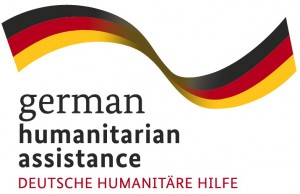

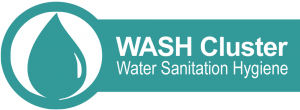

Supported by



